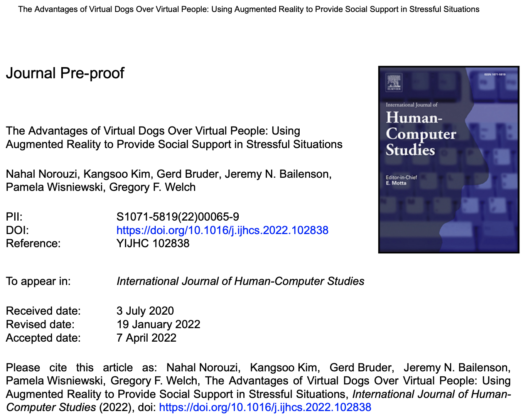Congratulations to Dr. Pamela Wisniewski! Her co-authored journal article titled “The Advantages of Virtual Dogs Over Virtual People: Using Augmented Reality to Provide Social Support in Stressful Situations” got published in the International Journal of Human-Computer Studies (IJHCS)! In this article, she co-authored with Nahal Norouzi, Kangsoo Kim, Gerd Bruder, Jeremy Beilenson, and Gregory Welch.
Abstract:
Past research highlights the potential for leveraging both humans and animals as social support figures in one’s real life to enhance performance and reduce physiological and psychological stress. Some studies have shown that typically dogs are more effective than people. Various situational and interpersonal circumstances limit the opportunities for receiving support from actual animals in the real world introducing the need for alternative approaches. To that end, advances in augmented reality (AR) technology introduce new opportunities for realizing and investigating virtual dogs as social support figures. In this paper, we report on a within-subjects 3×1 (i.e., no support, virtual human, or virtual dog) experimental design study with 33 participants. We examined the effect on performance, attitude towards the task and the support figure, and stress and anxiety measured through both subjective questionnaires and heart rate data. Our mixed-methods analysis revealed that participants significantly preferred, and more positively evaluated, the virtual dog support figure than the other conditions. Emerged themes from a qualitative analysis of our participants’ post-study interview responses are aligned with these findings as some of our participants mentioned feeling more comfortable with the virtual dog compared to the virtual human although the virtual human was deemed more interactive. We did not find significant differences between our conditions in terms of change in average heart rate; however, average heart rate significantly increased during all conditions. Our research contributes to understanding how AR virtual support dogs can potentially be used to provide social support to people in stressful situations, especially when real support figures cannot be present. We discuss the implications of our findings and share insights for future research.

